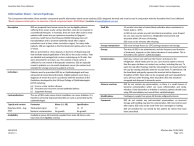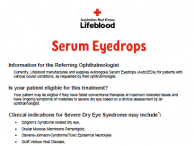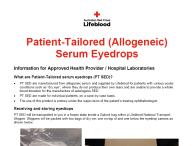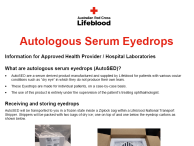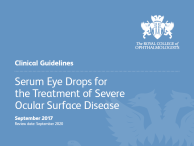Don’t have an account?
Select the donation type you’d like to make
SED are prepared from serum for use by eligible patients suffering from severe ocular surface disorders who do not respond to conventional therapies.
SED are presented in 1.5mL aliquots, in dispensing vials that enable topical application of the SED to the ocular surface. Vials are labelled and packaged into cartons containing up to 36 vials. One vial is intended for one day’s use. The content of each carton is sufficient for one month of therapeutic treatment.
SED are typically issued to patients as a six-month treatment course (six cartons) and intended for storage and use by patients at home.
SED have a shelf life of 12 months from date of whole blood collection when maintained in frozen state (≤ -15ºC). They do not contain any anti-microbial preservatives, so once thawed for use, must be stored in a refrigerated environment, and discarded within 24 hours of thawing.
Typical unit content and specifications
The typical unit content data is derived from Lifeblood process control testing. For each parameter, the mean value (± 1 SD) and specification is shown.
Data is for the period 1 November 2022 to 31 August 2023.
| Parameter | Mean | Specification |
| Total protein (g/L) | 13 | 11-17 |
| Bacterial contamination | No growth | No growth |
Availability
SED are only available to patients who meet strict clinical eligibility criteria. They can only be requested by ophthalmologists who are registered with the Australian Health Practitioner Regulation Agency (AHPRA) as ophthalmologists and have an active AHPRA reference number.
From 2026, SED will be offered on an allogeneic basis only (i.e., made from volunteer male AB donor blood).
Ophthalmologists are now invited to request AlloSED for eligible patients using the Serum Eyedrop Request form. Supply will commence from March 2026.
AlloSED are available to eligible patients for use within Australia. If patients require AlloSED for use outside Australia an export permit is required. Under exceptional circumstances the Australian government may grant approval for AlloSED to be supplied to Australian patients travelling aboard. All associated costs, including the cost of storage, import/export approvals, insurance/ indemnity and shipment post-delivery in Australia, must be borne by the patient. 3-months advance notice of an application is requested.
Modifications
There are no modifications available for serum eyedrops.
Updated December 2025






